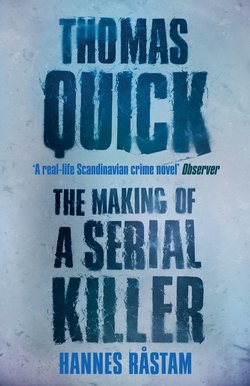Читать книгу Thomas Quick - Hannes Råstam - Страница 20
На сайте Литреса книга снята с продажи.
ОглавлениеTIME OUT
THREE SIGNIFICANT EVENTS took place in November 2001.
On 10 November an article was published in Dagens Nyheter, written by the historian Lennart Lundmark. It was entitled ‘Circus Quick, A Travesty of Justice’:
The guilty verdicts against Thomas Quick are an all-time low not only for the Swedish judicial system but also for Swedish crime reporting. There is no doubt that the entire story will be refuted.
A few days later, on 14 November, Leif G.W. Persson, the criminologist and professor of police studies, mocked the entire Quick investigation during the Legal Fair at the Stockholm Exhibition Centre. Levelling his comments at the impaired judgement of the investigators, Persson expressed his doubt that Quick had committed a single one of the murders for which he had been convicted.
The following day, Thomas Quick published his third article in DN Debatt, ‘Thomas Quick in the Wake of Accusations of Mythomania: I Will Not Take Part in Further Police Investigations’, in which he stated:
From now on I will take some time out, maybe for the rest of my life, from police investigations into confessions I have made for a number of murders.
Thomas Quick fiercely attacked Leif G.W. Persson, Kerstin Koorti and all the others who had called his confessions into doubt and were now making it impossible for him to continue cooperating with the police investigation.
To be met year after year by entirely unfounded statements from a troika of false prophets claiming that I am a mythomaniac, and to see this little group so uncritically treated by the mass media, is, and will continue to be, far too much of a strain. I resign from any further cooperation with police investigations, also for the sake of the victims’ loved ones who have accepted the evidence just as the courts have done. I do not want them to have to feel unsure about what has happened.
Three months later Thomas Quick took back his original name, Sture Bergwall. The man who had been created less than ten years earlier no longer existed.
The Thomas Quick era was over.
The judicial case of Thomas Quick, on the other hand, lived on in the culture pages of the newspapers, where the investigation and the verdicts were challenged by more and more people. Even some of the police detectives involved in the investigations came forward to express their doubts.
But Sture Bergwall remained at Säter Hospital, in silence, year after year.
When I visited him on 2 June 2008 his time out had lasted for almost seven years.
Why had Quick gone silent? Was it really because his credibility had been questioned by Leif G.W. Persson and other sceptics? Or were there other, hidden reasons?
